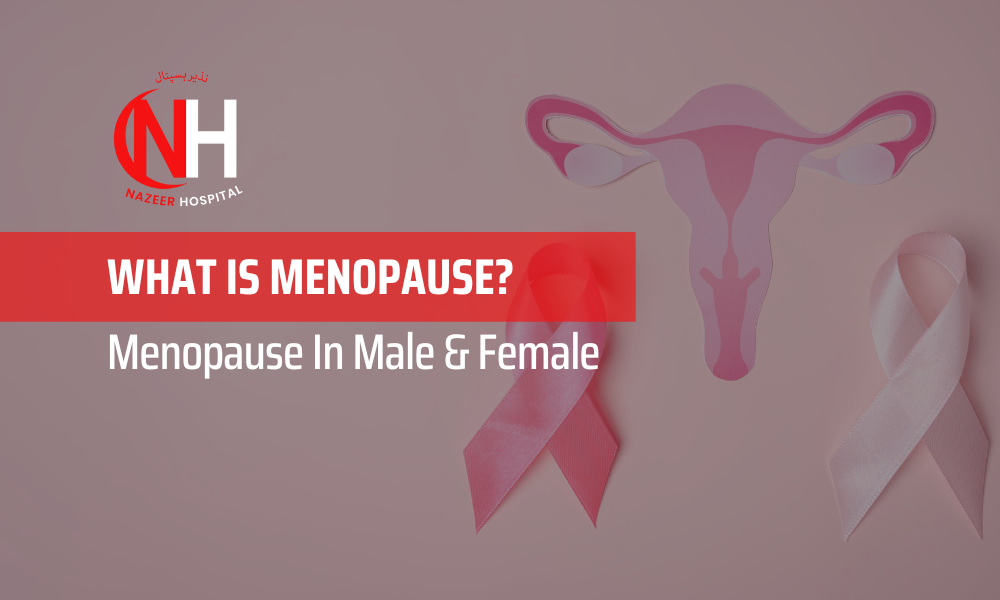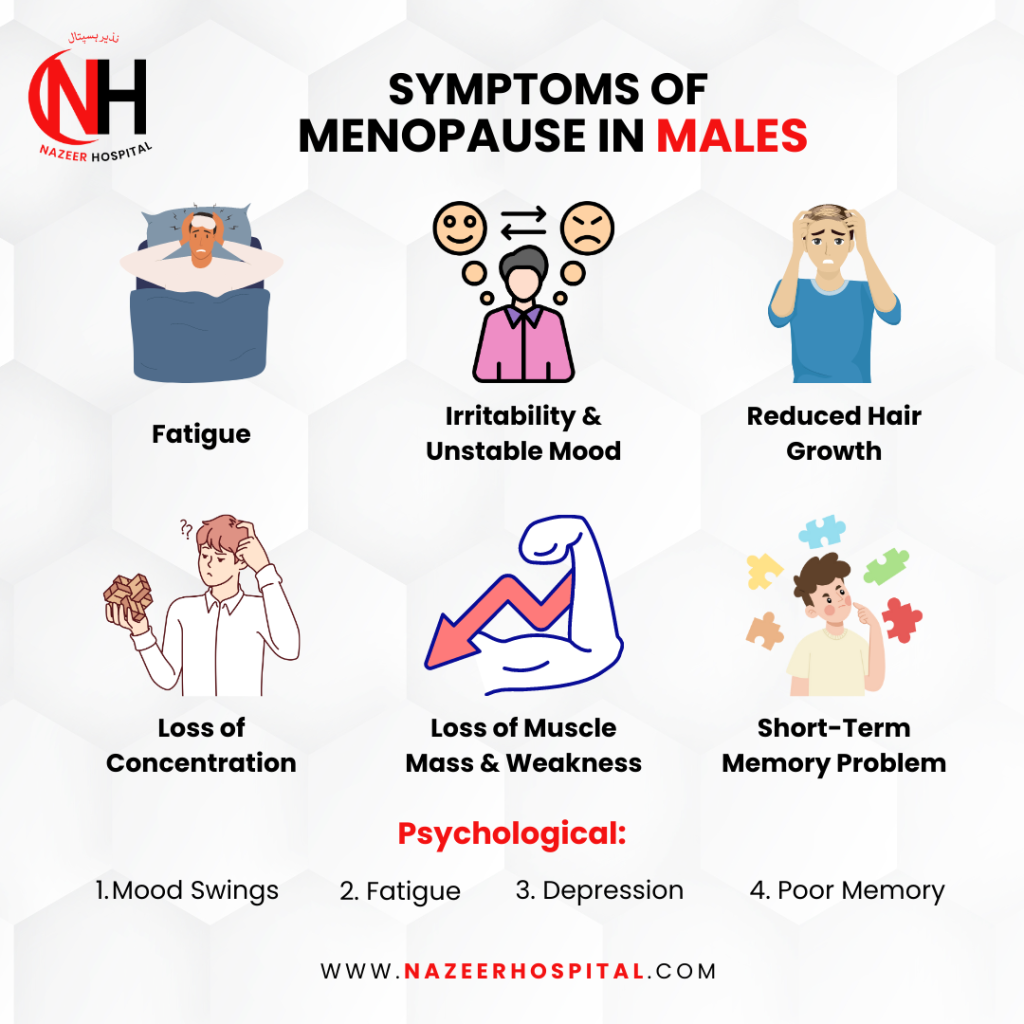Menopause: Understanding Its Stages, Symptoms, and Potential Effects

Menopause marks a transformative phase in a person’s life, bringing with it a spectrum of changes and challenges. This blog outlines what are the 34 symptoms of menopause, what are menopause in females, what are menopause in males, menopause age calculator, menopause age calculator, and what is late menopause.
Introduction to Menopause
Menopause is an essential and natural phase in the life of a woman. It marks a significant transition that typically occurs between the ages of 45 and 55, indicating the conclusion of her reproductive years. This biological process results from hormone changes, particularly a decline in estrogen levels. The cessation of menstruation and fertility characterizes menopause. It is not a medical condition or an illness but a normal part of the aging process.
Menopause Symptoms
Menopause brings many symptoms that can vary significantly from person to person. These symptoms are primarily a result of hormonal fluctuations in the body. One of the most common symptoms is hot flashes, which cause sudden feelings of heat and sweating, often accompanied by a flushed face. Another prevalent symptom is night sweats and hot flashes during sleep, leading to disrupted sleep patterns. Mood swings, irritability, and anxiety are also common due to hormonal changes impacting neurotransmitters that regulate mood. Fatigue and sleep disturbances can further exacerbate emotional challenges.
In addition to the emotional and psychological symptoms, there are physical changes that women may experience during menopause. Irregular periods are a hallmark of the transition, with menstrual cycles becoming less predictable until they eventually stop altogether. Vaginal dryness often leads to discomfort and pain during intercourse, reducing interest in sexual activity. Weight gain and shifts in body composition can prove vexing for numerous women during this period. These are just a few examples of the many symptoms associated with menopause, which can range from mild nuisances to significantly impacting daily life.
Menopause in Females
Menopause is an integral aspect of the female journey, symbolizing the conclusion of a woman’s reproductive potential. On average, menopause typically takes place around the age of 51. However, individual factors such as genetics, lifestyle, and overall health can influence the timing of menopause. Women often enter into a phase called perimenopause a few years before menopause. During perimenopause, estrogen levels start to decline, leading to irregular periods and the onset of many symptoms associated with menopause.
Understanding menopause is crucial for women as it allows them to anticipate and manage the changes that come with it. Maintaining a well-balanced diet, engaging in regular exercise, practicing stress-reduction techniques, and fostering open communication with healthcare experts can effectively ease the symptoms and challenges linked to menopause.

Menopause in Males
While menopause is typically associated with women, men experience hormonal changes as they age. Although less pronounced than in women, these changes are often called andropause. Unlike the sudden drop in estrogen that women experience, men’s testosterone levels gradually decline over time. This can result in decreased energy levels, muscle mass, and libido. Some men may also experience mood swings, irritability, and depression due to hormonal changes.
It’s important to note that while men experience hormonal changes, they do not undergo a complete cessation of fertility like women. However, understanding andropause can help men seek appropriate medical advice if they encounter physical or emotional challenges as they age.

Menopause Age Calculator
Predicting the precise age at which menopause will occur can be challenging due to various factors. Genetics play a significant role, as women often experience menopause around the same age as their mothers and sisters. Lifestyle choices such as smoking and maintaining a healthy weight can also impact the timing of menopause. Certain medical conditions and surgeries, such as hysterectomy, can also influence when menopause occurs.
Understanding these factors can help individuals gain insight into when they might expect to enter menopause. However, it’s essential to approach these calculations as estimates rather than certainties.
Menopause Age in Pakistan
In Pakistan, the average age of menopause falls within the range of 48 to 51, similar to many other parts of the world. However, cultural and socioeconomic factors can influence how menopause is perceived and experienced. Limited awareness about menopause and its associated symptoms can make women not recognize the changes their bodies are undergoing. Such a lack of comprehension can result in avoidable bewilderment and heightened anxiety.
Educational efforts to increase awareness about menopause in Pakistan are crucial. Providing women with accurate information about the physical and emotional changes they may experience can empower them to navigate this phase of life more confidently.
Late Menopause
While the average age of menopause is within a specific range, there are cases of late menopause occurring after age 55. Genetic factors, hormonal imbalances, and certain medical conditions can influence this. Late menopause might have implications for women’s health, including a higher risk of osteoporosis due to the prolonged period of lower estrogen levels.
Conversely, early menopause can also occur, often before age 40. This can result from genetic predisposition, medical treatments, or surgeries. Early menopause can have more pronounced effects on women’s health, and it’s essential for individuals experiencing it to seek medical guidance and support.
Final Thoughts
Menopause is a natural phase that every woman experiences as she ages. It marks the conclusion of the reproductive years and introduces various physical and emotional changes. Men also experience hormonal changes with age, although the process is less pronounced and different from that in women. Understanding menopause, its symptoms, and its implications is essential for women and men to navigate this phase of life confidently and fully aware.
Frequently Asked Questions
The 34 symptoms of menopause encompass a wide range of physical, emotional, and psychological changes. These include hot flashes, night sweats, mood swings, fatigue, irregular periods, vaginal dryness, weight gain, and many more.
Indeed, menopause is encountered by both females and males. Women undergo a complete halt in fertility, whereas men undergo a gradual decrease in testosterone levels known as andropause.
The age of menopause can be affected by genetic factors, lifestyle choices, and particular medical conditions. Additionally, environmental factors, like exposure to toxins, can also contribute to this process.
Yes, menopause can occur earlier or later than the average age range of 45 to 55. Genetic predisposition, medical treatments, and surgeries can all influence the timing of menopause.
Managing menopause symptoms involves adopting lifestyle modifications, considering hormone replacement therapy, and potentially utilizing medications. However, seeking guidance from healthcare professionals is essential to pinpoint the most fitting approach for addressing symptoms and enhancing overall health and well-being.
Dr. Masooma Husnain

I am a medical doctor at Nazeer Hospital, passionate about providing exceptional healthcare and support to my patients. Alongside my medical practice, I have also established myself as an accomplished author, contributing insightful articles to various publications in the field of medicine and healthcare.
With a solid educational background and clinical experience, I have honed my skills across multiple specialties as a House Officer at Pakistan Railway Hospital. My diverse experiences encompass rotations in General Medicine, Pediatrics, Orthopedics, and General Surgery, giving me a well-rounded understanding of different medical disciplines.
As an author, I leverage my expertise and in-depth knowledge to create informative and engaging articles that address contemporary healthcare challenges, treatment approaches, and patient care. My writing style reflects a blend of medical professionalism and a talent for conveying complex medical concepts in an easy-to-understand manner.

